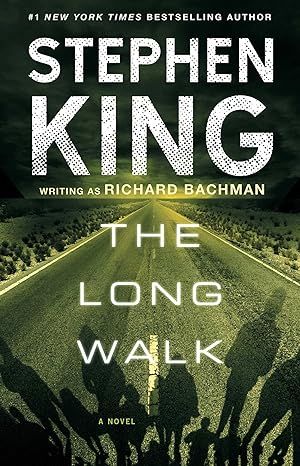The Long Walk
4.3
-
13,106 ratings
In this #1 national bestseller, master storyteller Stephen King, writing as Richard Bachman, tells the tale of the contestants of a grueling walking competition where there can only be one winner—the one that survives.
Against the wishes of his mother, sixteen-year-old Ray Garraty is about to compete in the annual grueling match of stamina and wits known as the Long Walk. One hundred boys must keep a steady pace of four miles per hour without ever stopping...with the winner being awarded “The Prize”—anything he wants for the rest of his life. But, as part of this national tournament that sweeps through a dystopian America year after year, there are some harsh rules that Garraty and ninety-nine others must adhere to in order to beat out the rest. There is no finish line—the winner is the last man standing. Contestants cannot receive any outside aid whatsoever. Slow down under the speed limit and you’re given a warning. Three warnings and you’re out of the game—permanently...
Kindle
$9.99
Available instantly
Audiobook
$0.00
with membership trial
Library Binding
$25.20
Paperback
$13.99
Ships from
Amazon.com
Payment
Secure transaction
ISBN-10
150114426X
ISBN-13
978-1501144264
Print length
320 pages
Language
English
Publisher
Scribner
Publication date
February 15, 2016
Dimensions
5.31 x 0.7 x 8.25 inches
Item weight
2.31 pounds
Popular highlights in this book
But of course it had hurt. It had hurt before, in the worst, rupturing way, knowing there would be no more you but the universe would roll on just the same, unharmed and unhampered.
Highlighted by 774 Kindle readers
We want to die, that’s why we’re doing it. Why else, Garraty? Why else?
Highlighted by 553 Kindle readers
Garraty thought that memories were like a line drawn in the dirt. The further back you went the scuffier and harder to see that line got. Until finally there was nothing but smooth sand and the black hole of nothingness that you came out of.
Highlighted by 487 Kindle readers
It seemed to him that the sound of his footfalls had become as loud to his ears as the sound of his own heartbeat. Vital, life and death sound.
Highlighted by 288 Kindle readers
Product details
ASIN :
B018ER7IPK
File size :
8496 KB
Text-to-speech :
Enabled
Screen reader :
Supported
Enhanced typesetting :
Enabled
X-Ray :
Not Enabled
Word wise :
Enabled
Editorial reviews
"A master storyteller." - Houston Chronicle
"An illusionist extraordinaire." - Publishers Weekly
"A master storyteller." - Houston Chronicle
"An illusionist extraordinaire." - Publishers Weekly
A master storyteller. ("Houston Chronicle") An illusionist extraordinaire. ("Publishers Weekly")
Sample
Part One
STARTING OUT
Chapter 1
“Say the secret word and win a hundred dollars.
George, who are our first contestants?
George . . . ? Are you there, George?”
—Groucho Marx You Bet Your Life
An old blue Ford pulled into the guarded parking lot that morning, looking like a small, tired dog after a hard run. One of the guards, an expressionless young man in a khaki uniform and a Sam Browne belt, asked to see the blue plastic ID card. The boy in the back seat handed it to his mother. His mother handed it to the guard. The guard took it to a computer terminal that looked strange and out of place in the rural stillness. The computer terminal ate the card and flashed this on its screen:
GARRATY RAYMOND DAVIS
RD 1 POWNAL MAINE
ANDROSCOGGIN COUNTY
ID NUMBER 49-801-89
OK-OK-OK
The guard punched another button and all of this disappeared, leaving the terminal screen smooth and green and blank again. He waved them forward.
“Don’t they give the card back?” Mrs. Garraty asked. “Don’t they—”
“No, Mom,” Garraty said patiently.
“Well, I don’t like it,” she said, pulling forward into an empty space. She had been saying it ever since they set out in the dark of two in the morning. She had been moaning it, actually.
“Don’t worry,” he said without hearing himself. He was occupied with looking and with his own confusion of anticipation and fear. He was out of the car almost before the engine’s last asthmatic wheeze—a tall, well-built boy wearing a faded army fatigue jacket against the eight o’clock spring chill.
His mother was also tall, but too thin. Her breasts were almost nonexistent: token nubs. Her eyes were wandering and unsure, somehow shocked. Her face was an invalid’s face. Her iron-colored hair had gone awry under the complication of clips that was supposed to hold it in place. Her dress hung badly on her body as if she had recently lost a lot of weight.
“Ray,” she said in that whispery conspirator’s voice that he had come to dread. “Ray, listen—”
He ducked his head and pretended to tuck in his shirt. One of the guards was eating C rations from a can and reading a comic book. Garraty watched the guard eating and reading and thought for the ten thousandth time: It’s all real. And now, at last, the thought began to swing some weight.
“There’s still time to change your mind—”
The fear and anticipation cranked up a notch.
“No, there’s no time for that,” he said. “The backout date was yesterday.”
Still in that low conspirator’s voice that he hated: “They’d understand, I know they would. The Major—”
“The Major would—” Garraty began, and saw his mother wince. “You know what the Major would do, Mom.”
Another car had finished the small ritual at the gate and had parked. A boy with dark hair got out. His parents followed and for a moment the three of them stood in conference like worried baseball players. He, like some of the other boys, was wearing a light packsack. Garraty wondered if he hadn’t been a little stupid not to bring one himself.
“You won’t change your mind?”
It was guilt, guilt taking the face of anxiety. Although he was only sixteen, Ray Garraty knew something about guilt. She felt that she had been too dry, too tired, or maybe just too taken up with her older sorrows to halt her son’s madness in its seedling stage—to halt it before the cumbersome machinery of the State with its guards in khaki and its computer terminals had taken over, binding himself more tightly to its insensate self with each passing day, until yesterday, when the lid had come down with a final bang.
He put a hand on her shoulder. “This is my idea, Mom. I know it wasn’t yours. I—” He glanced around. No one was paying the slightest attention to them. “I love you, but this way is best, one way or the other.”
“It’s not,” she said, now verging on tears. “Ray, it’s not, if your father was here, he’d put a stop to—”
“Well, he’s not, is he?” He was brutal, hoping to stave off her tears . . . what if they had to drag her off? He had heard that sometimes that happened. The thought made him feel cold. In a softer voice he said, “Let it go now, Mom. Okay?” He forced a grin. “Okay,” he answered for her.
Her chin was still trembling, but she nodded. Not all right, but too late. There was nothing anyone could do.
A light wind soughed through the pines. The sky was pure blue. The road was just ahead and the simple stone post that marked the border between America and Canada. Suddenly his anticipation was greater than his fear, and he wanted to get going, get the show on the road.
“I made these. You can take them, can’t you? They’re not too heavy, are they?” She thrust a foil-wrapped package of cookies at him.
“Yeah.” He took them and then clutched her awkwardly, trying to give her what she needed to have. He kissed her cheek. Her skin was like old silk. For a moment he could have cried himself. Then he thought of the smiling, mustachioed face of the Major and stepped back, stuffing the cookies into the pocket of his fatigue jacket.
“G’bye, Mom.”
“Goodbye, Ray. Be a good boy.”
She stood there for a moment and he had a sense of her being very light, as if even the light puffs of breeze blowing this morning might send her sailing away like a dandelion gone to seed. Then she got back into the car and started the engine. Garraty stood there. She raised her hand and waved. The tears were flowing now. He could see them. He waved back and then as she pulled out he just stood there with his arms at his sides, conscious of how fine and brave and alone he must look. But when the car had passed back through the gate, forlornness struck him and he was only a sixteen-year-old boy again, alone in a strange place.
He turned back toward the road. The other boy, the dark-haired one, was watching his folks pull out. He had a bad scar along one cheek. Garraty walked over to him and said hello.
The dark-haired boy gave him a glance. “Hi.”
“I’m Ray Garraty,” he said, feeling mildly like an asshole.
“I’m Peter McVries.”
“You are ready?” Garraty asked.
McVries shrugged. “I feel jumpy. That’s the worst.”
Garraty nodded.
The two of them walked toward the road and the stone marker. Behind them, other cars were pulling out. A woman began screaming abruptly. Unconsciously, Garraty and McVries drew closer together. Neither of them looked back. Ahead of them was the road, wide and black.
“That composition surface will be hot by noon,” McVries said abruptly. “I’m going to stick to the shoulder.”
Garraty nodded. McVries looked at him thoughtfully.
“What do you weigh?”
“Hundred and sixty.”
“I’m one-sixty-seven. They say the heavier guys get tired quicker, but I think I’m in pretty good shape.”
To Garraty, Peter McVries looked rather more than that—he looked awesomely fit. He wondered who they were that said the heavier guys got tired quicker, almost asked, and decided not to. The Walk was one of those things that existed on apocrypha, talismans, legend.
McVries sat down in the shade near a couple of other boys, and after a moment, Garraty sat beside him. McVries seemed to have dismissed him entirely. Garraty looked at his watch. It was five after eight. Fifty-five minutes to go. Impatience and anticipation came back, and he did his best to squash them, telling himself to enjoy sitting while he could.
All of the boys were sitting. Sitting in groups and sitting alone; one boy had climbed onto the lowest branch of a pine overlooking the road and was eating what looked like a jelly sandwich. He was skinny and blond, wearing purple pants and a blue chambray shirt under an old green zip sweater with holes in the elbows. Garraty wondered if the skinny ones would last or burn out quickly.
The boys he and McVries had sat down next to were talking.
“I’m not hurrying,” one of them said. “Why should I? If I get warned, so what? You just adjust, that’s all. Adjustment is the key word here. Remember where you heard that first.”
He looked around and discovered Garraty and McVries.
“More lambs to the slaughter. Hank Olson’s the name. Walking is my game.” He said this with no trace of a smile at all.
Garraty offered his own name. McVries spoke his own absently, still looking off toward the road.
“I’m Art Baker,” the other said quietly. He spoke with a very slight Southern accent. The four of them shook hands all around.
There was a moment’s silence, and McVries said, “Kind of scary, isn’t it?”
They all nodded except Hank Olson, who shrugged and grinned. Garraty watched the boy in the pine tree finish his sandwich, ball up the waxed paper it had been in, and toss it onto the soft shoulder. He’ll burn out early, he decided. That made him feel a little better.
“You see that spot right by the marker post?” Olson said suddenly.
They all looked. The breeze made moving shadow-patterns across the road. Garraty didn’t know if he saw anything or not.
“That’s from the Long Walk the year before last,” Olson said with grim satisfaction. “Kid was so scared he just froze up at nine o’clock.”
They considered the horror of it silently.
“Just couldn’t move. He took his three warnings and then at 9:02 AM they gave him his ticket. Right there by the starting post.”
Garraty wondered if his own legs would freeze. He didn’t think so, but it was a thing you wouldn’t know for sure until the time came, and it was a terrible thought. He wondered why Hank Olson wanted to bring up such a terrible thing.
Suddenly Art Baker sat up straight. “Here he comes.”
A dun-colored jeep drove up to the stone marker and stopped. It was followed by a strange, tread-equipped vehicle that moved much more slowly. There were toy-sized radar dishes mounted on the front and back of this halftrack. Two soldiers lounged on its upper deck, and Garraty felt a chill in his belly when he looked at them. They were carrying army-type heavy-caliber carbine rifles.
Some of the boys got up, but Garraty did not. Neither did Olson or Baker, and after his initial look, McVries seemed to have fallen back into his own thoughts. The skinny kid in the pine tree was swinging his feet idly.
The Major got out of the jeep. He was a tall, straight man with a deep desert tan that went well with his simple khakis. A pistol was strapped to his Sam Browne belt, and he was wearing reflector sunglasses. It was rumored that the Major’s eyes were extremely light-sensitive, and he was never seen in public without his sunglasses.
“Sit down, boys,” he said. “Keep Hint Thirteen in mind.” Hint Thirteen was “Conserve energy whenever possible.”
Read more
About the authors
Stephen King
Stephen King is the author of more than fifty books, all of them worldwide bestsellers. His first crime thriller featuring Bill Hodges, MR MERCEDES, won the Edgar Award for best novel and was shortlisted for the CWA Gold Dagger Award. Both MR MERCEDES and END OF WATCH received the Goodreads Choice Award for the Best Mystery and Thriller of 2014 and 2016 respectively.
King co-wrote the bestselling novel Sleeping Beauties with his son Owen King, and many of King's books have been turned into celebrated films and television series including The Shawshank Redemption, Gerald's Game and It.
King was the recipient of America's prestigious 2014 National Medal of Arts and the 2003 National Book Foundation Medal for distinguished contribution to American Letters. In 2007 he also won the Grand Master Award from the Mystery Writers of America. He lives with his wife Tabitha King in Maine.
Read more
Reviews
Customer reviews
4.3 out of 5
13,106 global ratings
Jonathan Cassens
5
could not stop reading
Reviewed in the United States on September 7, 2024
Verified Purchase
From the beginning of the walk you start to identify with same facet of each walker. Each walker has a trait of someone you know, both good and bad. Each walker has a story and their own reasons- or lack of reasons to be on this perilous journey. Warning— if you pick this book up and start reading be prepared to not be able to put it down.
Gypsygirl4120
5
The Long Walk by Stephen King
Reviewed in the United States on September 10, 2024
Verified Purchase
The Long Walk by Stephen King (writing as Richard Bachmann) is the quiescential Stephen King horror story. It is hardcore, no apologies and pure unadulterated King. This is set back during the 60's in a police state where 100 boys are chosen randomly each year to participate in a "Walk" across the state. King weaves a story so twisted that it hurt my heart. It tells of the relationships men form during traumatic events and the question how did I get in this situation. It's definitely worth your time to read this and come up with your own take on what the story is a metaphor for.
Read more
6 people found this helpful
B. Sullivan
5
Oddly enough a page turner
Reviewed in the United States on September 9, 2024
Verified Purchase
You wouldn't think a story about walking would be a page turner, but I found myself taking breaks from other stuff I had to do over the past two days and sitting down to read another 20 pages. It's 8 a.m. now, I started reading when I woke up to weak sunlight at 6, and I just read the last page.
Sometimes I found the exchanges between the main group of characters awkward when they sounded more like the author just using the characters as ventriloquist dummies for his own opinions and musings.
But most of the time, I think the meandering and sometimes poignant thoughts and existential sparring were probably the kind of things that would bubble up during any experience that forces people to endure the unendurable. Trail of Tears. A movie I remember about Australian women on a forced march as prisoners of the Japanese. Any of those stories about being a prisoner of war, or trying to survive in a barbarous pit of a prison.
On a lighter note, anyone who's grown up in New England, especially Maine of course, will appreciate how familiar the sights along the route feel. Stephen King is good at that.
I think this is one of those books that will linger in the imagination for a while. Right now, I still feel like I am trudging along in shredded shoes and shivering in rain soaked clothes with a hollow stomach and a numb sense of horror at the insanity of being human.
Read more
3 people found this helpful
Top Stephen King titles
View all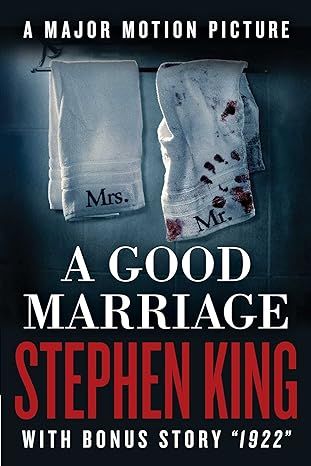
A Good Marriage
4.1
-
5,995
$4.99
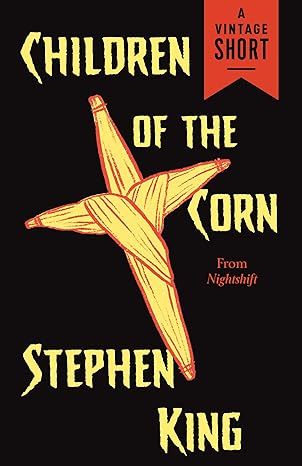
Children of the Corn (Kindle Single) (A Vintage Short)
4.3
-
1,084
$0.99
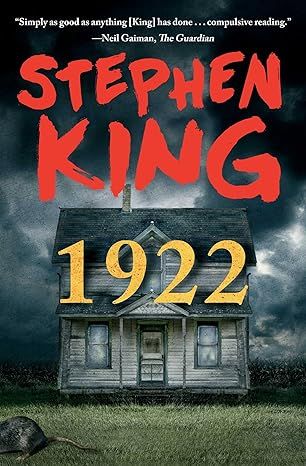
1922
4.6
-
6,082
$7.99

UR
4.3
-
6,140
$3.99

The Langoliers
4.6
-
1,014
$6.49

The Girl Who Loved Tom Gordon: A Novel
4.5
-
4,774
$1.17
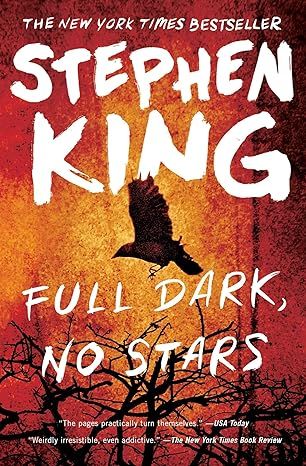
Full Dark, No Stars
4.6
-
6,762
$5.00

Gwendy's Button Box: A Novella (Gwendy's Button Box Trilogy Book 1)
4.5
-
21,335
$3.88
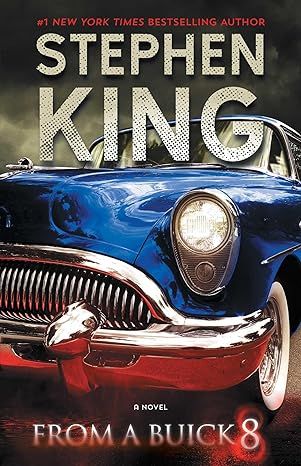
From a Buick 8: A Novel
4.3
-
2,174
$11.99

Gerald's Game
4.2
-
3,838
$1.97
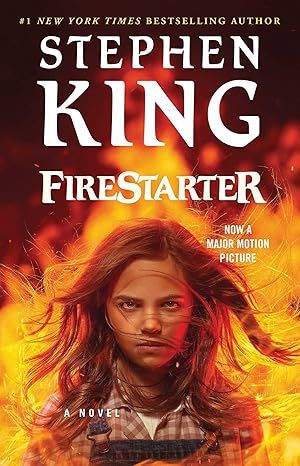
Firestarter
4.6
-
5,489
$9.99
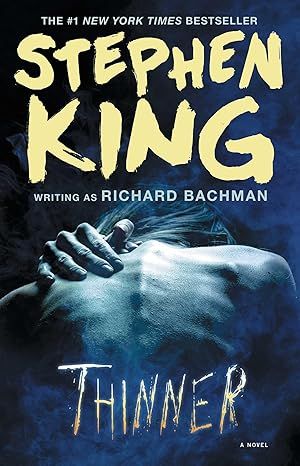
Thinner
4.5
-
3,107
$2.50
Similar Books
Best sellers
View all
The Tuscan Child
4.2
-
100,022
$8.39

The Thursday Murder Club: A Novel (A Thursday Murder Club Mystery)
4.3
-
155,575
$6.33

Sapiens: A Brief History of Humankind
4.6
-
140,302
$13.49

The Butterfly Garden (The Collector, 1)
4.3
-
88,556
$9.59

Things We Hide from the Light (Knockemout Series, 2)
4.4
-
94,890
$11.66

The Last Thing He Told Me: A Novel
4.3
-
154,085
$2.99

The Perfect Marriage: A Completely Gripping Psychological Suspense
4.3
-
143,196
$9.47

The Coworker
4.1
-
80,003
$13.48

First Lie Wins: A Novel (Random House Large Print)
4.3
-
54,062
$14.99

Mile High (Windy City Series Book 1)
4.4
-
59,745
$16.19

Layla
4.2
-
107,613
$8.99

The Locked Door
4.4
-
94,673
$8.53
